I meant to open this recommendation list with a plea for more haunted space books, but then the brilliant Kali Wallace did it with far more eloquence than I ever could. Why are there so few ghosts in space? Put more ghosts in space! I love it when planets are full of ghosts and your tech can’t protect you. I love it when the tech is full of ghosts, and your tech can’t protect you because it’s full of goddamn ghosts. Space is already very scary, and if all your redundancies are designed to prevent mechanical failure and resulting hypoxia, that means they probably are not designed to stop ghosts. Here are my best recommendations for books set in space that might or might not be very, very, very full of ghosts.
(To learn whether the ghost in each case was capitalism all along, please skip to the bottom of this post.)1
Dead Silence by S. A. Barnes
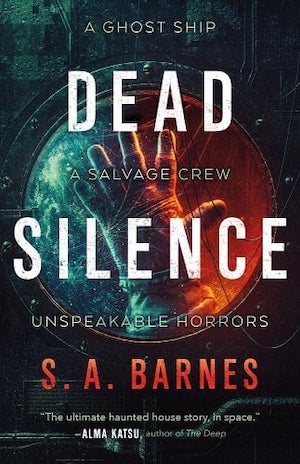
When I read the description of this book, I literally clapped my hands and shrieked. Claire Kovalik and her crew are on their last mission before their jobs are liquidated, and she’s coping with it about how you’d expect. Then, as they’re getting ready to head back to the rendezvous point, they pick up an ancient distress signal. It’s coming from the first and only leisure cruise spaceship, the Aurora, whose unexplained disappearance several decades ago effectively put paid to the idea of luxury cruises in space. If Claire and her crew can claim the ship as salvage, they’ll have enough money to do whatever they want.
Except that when they come aboard the Aurora, they realize that something’s not right. The ship is packed with passengers who appear to have gone mad and died by violence, either brutal suicides or even-more-brutal homicides—and Claire’s crew has no idea why. The plan is to spend three days in the Aurora bringing her back within comms range so they can claim their prize, but within hours they’re hearing voices and seeing people who aren’t there. Claire’s an old hand at seeing ghosts, but that doesn’t mean she’ll be able to get her crew through this safely.
Dead Silence is a proper ghost story, complete with a narrator who’s trying desperately to shake off her own unreliability. The frame of the first half of the book is that she’s trying to tell her story—calmly, rationally—to skeptical representatives of the company that employs her, with the caveats that she might be actively psychotic and she definitely can’t remember how she made it off the Aurora or whether any of her crew are still alive. Barnes has given us a book that’s classically ghosty but still offers new twists and surprises.
Braking Day by Adam Oyebanji
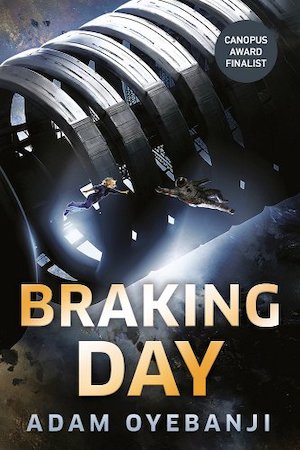
Adam Oyebanji’s debut SF novel combines two of my favorite things: ghosts in space, and biting depictions of the many ills that arise from the unjust distribution of resources. Our protagonist, Ravi Macleod, is slated to be the first member of his family to attain respectability, just on the eve of what his generation ship calls Braking Day: their arrival at the ship’s final destination of Tau Ceti. To become an officer, all Ravi has to do is keep his nose clean for one more semester—except that he starts to see visions of a girl with unbound blonde hair floating helmetless outside the ship. Nobody who spends any time in zero-g keeps their hair loose around their shoulders, and more importantly, space will for sure kill you if you’re not wearing a helmet. [Unless you are General Leia Organa.]
Ravi’s haunted not only by the impossible floating girl, but by the specter of the all-powerful AIs the Archimedes fled Earth to avoid. AIs are super illegal on board the Archimedes, and the ruling class have no plans to change that when they reach Tau Ceti. Except that if Ravi wants to find out what’s going on with his ghost girl, he’ll have to make use of his cousin Boz’s illegally created AI. Braking Day has some debut novel–typical pacing problems, but it’s a fun read that left me eager for more books by this author.
Harrow the Ninth by Tamsyn Muir
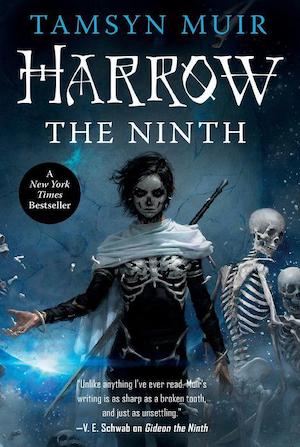
After the climactic battle of Gideon the Ninth, Harrowhark Nonagesimus wakes up in a strange place clutching a sword that seems to really hate her and with very dicey memories of all that came before. She has sort of achieved Lyctorhood, but also sort of not, which makes her a warrior ill suited to the battle her God needs her to fight. In another reality or another timeline, she is back at Canaan House, hobnobbing with a bunch of maybe dead, definitely annoying people from the other houses.
The obvious choice would have been the first book in the Locked Tomb series, and of course you should read that one first, or else Harrow won’t make any sense. (Jokes! Harrow won’t make sense no matter what you do! Good luck, suckers!) But Harrow the Ninth is orders of magnitude more haunted than Gideon. Not only is there an extremely super dead lady wandering the halls to do troubling deeds like making out with alive people and then locking them in furnaces, but the protagonist herself is stuffed to the brim with ghosts. The bonus with Harrow is that you simply cannot predict the day or the hour when someone you thought was safely dead will pop up corporeal once again to fuck up all your plans.
The Luminous Dead by Caitlin Starling
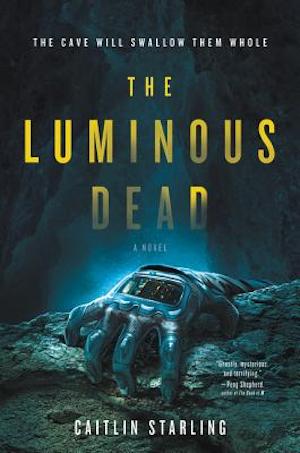
Perhaps my most triumphant book rec of recent memory occurred when a pal tweeted “the inherent eroticism of ground control to mission communications.” I could not smash the Reply button fast enough to recommend Caitlin Starling’s The Luminous Dead. Gyre signed on to a mapping mission in the expectation that she’d have a robust ground control team and a simple job of finding and mapping resources. But ground control is just one woman called Em. Her stake in the mission remains shrouded in mystery. She’s willing to do just about anything (to Gyre) in order to get what she wants. And Gyre can’t shake the feeling, as she dives deeper into the planet’s cave system, that she’s not alone. She finds traces of disturbances that shouldn’t be there; feels eyes on her even though she’s alone; sees the faces of people she knows to be dead.
If I were going to pitch this book to someone who hadn’t mentioned the inherent eroticism of ground control to mission communications, I’d probably say that it’s the story of two ruthless queer women looking for answers in haunted space caves that nobody really thinks will get them what they want. The claustrophobia of Gyre’s descent blends perfectly with the sparseness of the cast: Em is the only person Gyre has to speak to, ever, and it gradually starts to come clear to Gyre that the reverse is also true. These two women need each other as much as they mistrust each other, which makes for a deeply compelling experience as Gyre goes deeper into the cave system and begins to know Em a little better.
I am very afraid of caves. These caves are very frightening. Space horror at its finest.
Far From the Light of Heaven by Tade Thompson
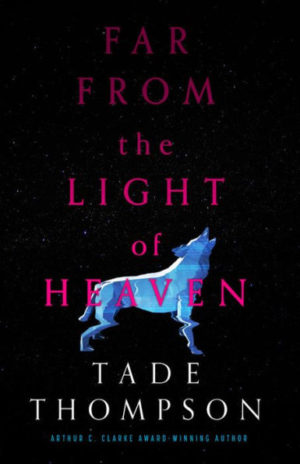
I am a simple woman with simple tastes. When someone says to me locked door murder mystery, I am already in. And this one’s in space.
Ragtime is a colony ship ferrying a thousand humans in cryosleep across the light-years to their new home in the Lagos system. But when first mate Michelle Campion comes out of cryo, she finds the ship’s disposal unit packed full of chopped-up bodies of the passengers. A good and upright starship officer in the mold of your Rikers and your Kira Neryses, she reports the situation to her superiors, and investigator Rasheed Fin is dispatched to solve the murders. When he makes it aboard the ship, the ship’s bots—which are supposed to be under the control of the AI—start going rogue, and Campion starts seeing visions of a wolf on board the ship. To make matters more complicated, Campion’s uncle comes on board with his daughter Joké, who as a half-Lamber possesses the power to slip in and out of reality.
Far from the Light of Heaven feels solidly grounded in the challenges of space travel, which makes a striking contrast to the increasing slipperiness of reality on board the Ragtime. What looks at first like a simple (if horrifying) murder case proves rife with contradictions and impossibilities. Literally and metaphorically, Ragtime is haunted by people alive and dead. Joké and her fellow Lambers slip among realities in search of some kind of piece, and the bloody legacies of the past carve indelibly at the present.
***
What are your favorite haunted space stories?
Jenny Hamilton reads the end before she reads the middle. She reviews for Strange Horizons and Lady Business and can be found at her website or on Twitter @readingtheend.
[1]Coda: Was the ghost really capitalism all along? (1) YES, but also no. (2) Mostly, but not entirely, no. (3) I don’t think so but honestly who ever knows what Tamsyn Muir is doing? (4) yes, ish. (5) Y E S.










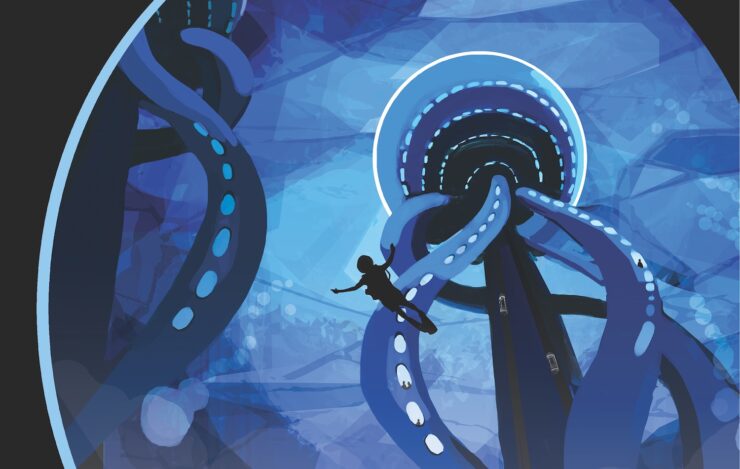
Dead Silence sounds like a dead ringer for the movie Event Horizon, including all the gore. Was the book an inspiration for the movie, or the movie an inspiration for the book? Or coincidence?
I would add here Fiasco, by the great Stanislaw Lem. It is a story of a first contact, and it is terrifying in a very twisted mental way. The biggest question there is not why the aliens are not there or why the don’t want to make contact; the biggest question is who we are – this is embodied with the uncertainty who the main character is. Now, this is a story of an interstellar expedition that flies on an asteroid. Except they find in there two dead astronauts, frozen on the ice. One is the lead characted from a number of short stories of Lem – a space captain Pirks. He is the embodiment of quiet wisdom and restraint and the oter is pretty much everything that Pirks is not. The question is deeper, thogh – it is not just who the astronaust is, but which one of them _is_ the true representative of the the human kind. So, it is a novel about who we are and although Lem never gives a direct answer, his hint is that we are not the lovable kind.
Terrific read, like most of the stuff that Lem left to us.
@1, I’ve read Dead Silence, and no real spoilers, but the cause of the event is not supernatural in origin, so I would say coincidence, or maybe just inspiration.
I got about a quarter of the way into Dead Silence before feeling like throwing it at a wall. It came across as more about mysterious happenings in a poorly-framed Syfy setting than ghostly scares in a coherent space environment. It’s not like Event Horizon or Solaris where the plot revolves around the protagonists dealing with their personal ghosts in more tangible form than normal.
Gideon the Ninth I loved and heartily recommend; Harrow the Ninth takes more dedication to dig into.
Peter Watt’s Blindsight is one of my favorites. Can’t go wrong with Space Vampires and tenticled aliens!
Maybe not as scary as some but Nightflyers, by GRRM is basically (spoiler)a haunted house story.
I will second the recommendation of Peter Watts’ Blindsight! It’s super creepy.
Back on your theme of ghosts who can’t just be fought with tech, Peter Hamilton’s Night’s Dawn Trilogy features an interstellar civilization facing a supernatural threat. A rare confluence of events connects purgatory to normal space and the souls of humanity’s unrequited dead begin to possess the bodies of the living.
(I don’t recall it being too explicit, but the monstrous personalities from human history turn out to be unpleasant to other people. Also: Capitalism.)
Far from the Light of Heaven was brilliant and creepy. Read it
The Luminous Dead was claustrophobic, creepy and brilliant. Read it.
Not horror as I recall, but _Carmen Miranda’s Ghost Is Haunting Space Station 3_, edited by Don Sakers is cheerful (mostly cheerful?) ghosts in space stories.
The book has become expensive, but here’s the song:
https://www.youtube.com/watch?v=hbs4Ei–Gk4&ab_channel=SongsfromtheStars
There’s a lot of sci-fi ghost stories, with the explanation involving personality uploads (sometimes unintentional and/or involuntary) instead of restless souls or psychic imprints. The narrative function is (or can be, there’s other ways to go) basically identical to that of the ghost in the aether, and stories where people are haunted by the (sometimes vengeful) electronic ghosts of those who died with unfinished business are an established trope. They’re just usually filed under sci-fi rather than Horror because all the handwavium uses computer terminology. To use two books I’ve recently read, in Adrian Tchaikovsky’s Bear Head, a young man (who is a cyborg living on 22nd Century Mars) is possessed by a murder victim ( the recorded personality of an uplifted bear), who can only be laid to rest by solving her murder and exacting vengeance on the killer and hijacks his life to that end.
In The City Beautiful by Aden Polydoros a young man (who is a Romanian Jew living in 19th century Chicago) is possessed by a murder victim (the dybbuk of his best friend/secret crush) who can only be laid to rest by solving his murder and exacting vengeance on the killer and hijacks his life to that end.
I feel that these are both ghost stories and can also be described as horror stories. Certainly there’s a lot or really disturbing things happening.
12: Bear Head was tremendous (as was its predecessor, Dogs of War) not least for including one of the most unpleasant and convincing villains I’ve ever come across in SF. I never thought of it as a ghost story before, for exactly the reasons you state, but I can absolutely see how it fits that category.
Richard Morgan’s Woken Furies covers similar ground, but it isn’t quite as good; long after a failed revolution, salvage teams combing through the battlefield have a problem – team members are starting to claim to be the (vanished and presumed dead) leader of the revolution, and they want to finish the job they started all those years ago.
There are even ghostly elements to Neuromancer – the Dixie Flatline is a recording of a dead man, and as a result not a little creepy.
@14
I was thinking of using him as an example, but rhe parallels between the two I used were too good
Maybe “The Game of Rat and Dragon” by Cordwainer Smith? The “dragons” are not quite ghosts, but close.
@9 (jeffronicus) hear for this comment. I am not a fan of horror and try to avoid it but this (huge trilogy) one kept me riveted and coming back for more whenever I had to put it down.
Am I wrong in remembering that Dan Simmons’ Endymion books were creepy af (without any supernatural)?
@17.
ISTR that there’s some stuff that’s portrayed in-text as.maybe supernatural and not fully explainable by science known to the characters, but it’s been a long time. Definitely can be counted as horror, though. It’s a wider genre than it’s normally thought of.
Love the recs in the article and the comments, but posting just to tell the author that her description of Harrow is *chef’s kiss*.
I enjoyed The Luminous Dead and I read anything Tade Thompson writes (there’s quite a lot to choose and they have been both consistently good and just different enough to not feel oversaturated reading a lot by the same author in a relatively short span of time). A couple others on this list I might check.
Having read Nona, I’d say yes on it being capitalism all along in the Locked Tomb series
Space horror is my fave! I’m a big fan of the Luminous Dead — anyone got anymore recs for queer space horror?